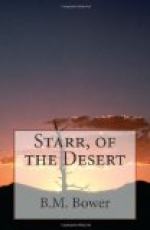“IS HE THEN DEAD—MY SON?”
Starr hurried down the bluff, slipping, sliding, running where the way was clear of rocks. So presently he came to the stone wall, vaulted over it, and stopped beside the tragic little group dimly outlined in the house yard just off the porch.
“My son—my son!” the old woman was wailing, on her knees beside a long, inert figure lying on its back on the hard-packed earth. Back of her the peona hovered, hysterical, useless. Luis, half dressed and a good deal dazed yet from sleep and the suddenness of his waking, knelt beside his mother, patting her shoulder in futile affection, staring down bewilderedly at Estan.
So Starr found them. Scenes like this were not so unusual in his life, which had been lived largely among unruly passions. He spoke quietly to Luis and knelt to see if the man lived. The senora took comfort from his calm presence and with dumb misery watched his deft movements while he felt for heartbeats and for the wound.
“But is he then dead, my son?” she wailed in Spanish, when Starr gently laid down upon Estan’s breast the hand he had been holding. “But so little while ago he lived and to me he talked. Ah, my son!”
Starr looked at her quietingly. “How, then, did it happen? Tell me, senora, that I may assist,” he said, speaking easily the Spanish which she spoke.
“Ah, the good friend that thou art! Ah, my son that I loved! How can I tell what is mystery? Who would harm my son—my little Estan that was so good? Yet a voice called softly from the dark—and me, I heard, though to my bed I had but gone. ‘Estan!’ called the voice, so low. And my son—ah, my son!—to the door he went swiftly, the lampara in his hand, holding it high—so—that the light may shine into the dark.
“‘Who calls?’ Me, I heard my son ask—ah, never again will I hear his voice! Out of the door he went—to see the man who called. To the porch-end he came—I heard his steps. Ah, my son! Never again thy dear footsteps will I hear!” And she fell to weeping over him.
“And then? Tell me, senora. What happened next?”
“Ah—the shot that took from me my son! Then feet running away—then I came out—Ah, querido mio, that thou shouldst be torn from thy mother thus!”
“And you don’t know—?”
“No, no—no—ah, that my heart should break with sorrow—”
“Hush, mother! ’Twas Apodaca! He is powerful—and Estan would not come into the Alliance. I told him it would be—” Luis, kneeling there, beating his hands together in the dark, spoke with the heedless passion of youth.
“Which Apodaca? Juan?” Starr’s voice was low, with the sympathetic tone that pulls open the floodgates of speech when one is stricken hard.
“Not Juan; Juan is a fool. Elfigo Apodaca it was—or some one obeying his order. Estan they feared—Estan would not come in, and the time was coming so close—and Estan held out and talked against it. I told him his life would pay for his holding out. I told him! And now I shall kill Apodaca—and my life also will pay—”




